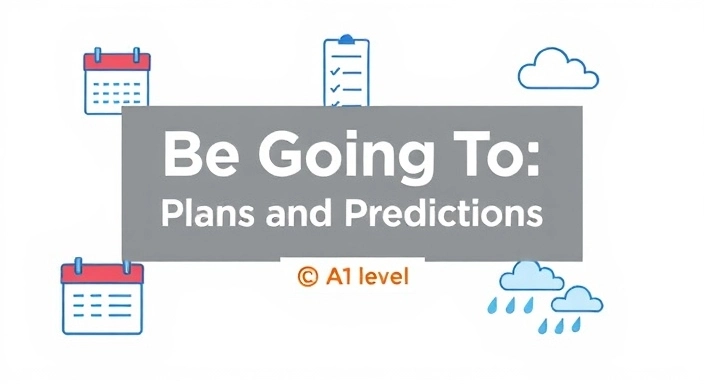Be Going To – Plans and Predictions
- Home ›
- Grammar ›
- A1 Elementary ›
- Be Going To – Plans and P...




Use the verbs in brackets to complete these sentences with be going to affirmative or negative.
Use the words in brackes to write questions using be going to.
Use the words in brackes to write questions using be going to.

- 06 December, 2024
- 622
- Grammar
- A1 Elementary
Be Going To – Plans and Predictions
The structure be going to is used to talk about plans and predictions. It is an essential part of English Grammar at the A1 level, helping learners express intentions and future outcomes based on evidence. Let’s explore its usage step by step!
Structure
Be going to consists of:
- The verb be (am, is, are)
- Going to
- The base form of the main verb
Examples:
- I am going to visit my grandparents tomorrow.
- She is going to study medicine next year.
- He going to eat lunch. (Missing 'is')
Uses
1. Predictions
We use be going to to make predictions about the future based on present evidence.
- Look at those clouds! It is going to rain.
- It will rain because the sky is dark. (‘Will’ is incorrect when evidence is visible.)
2. Plans or Intentions
Use be going to to talk about plans made before the moment of speaking.
- We are going to visit France next summer.
- We will visit France next summer. (‘Will’ is less specific for planned actions.)
3. Future Time Expressions
Commonly used with future time expressions like tomorrow, next week, tonight, etc.
- I am going to start a new job next month.
- They are going to play football tomorrow evening.
Common Mistakes
- She going to the park. (Missing 'is')
- We are going to goes shopping. (Use the base form 'go')
- He is going to watch a movie tonight.
Practice Sentences
Fill in the blanks with the correct form of be going to:
- They __________ (visit) their grandparents next weekend.
- It __________ (rain) heavily. Look at those clouds!
- I __________ (not buy) that dress because it’s too expensive.
Quick Tips
- Always match the form of be with the subject (I am, you are, he/she/it is).
- Do not conjugate the verb after going to.
- Use context clues to decide if you’re describing a plan or making a prediction.
Unfortunately, we currently do not have teaching materials available on this topic. We are working with all our efforts to prepare it. You can subscribe to Verbooze to be notified once the teaching materials are ready.




English Learning Made Easy & Accessible for Everyone
Boost your English skills with interactive lessons, grammar explanations, reading and listening exercises, and real-time feedback. Join our growing community and start improving today — all completely free!

